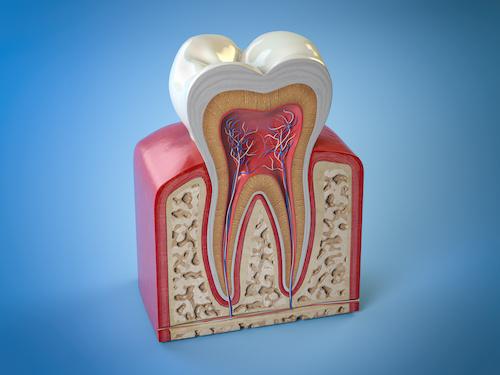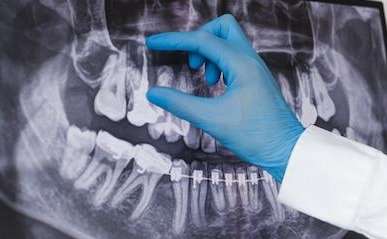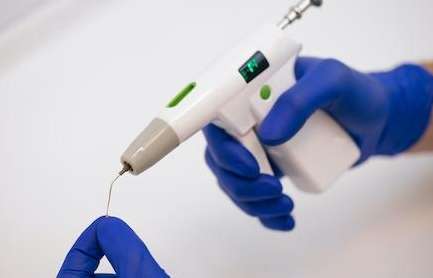
Root Canal Treatment
At Curtis Endodontics, we specialize in treating soft tissue called pulp, which is located in the hollow center of a tooth. When bacteria enter this area, pulp becomes infected or damaged, which can cause severe pain. The only way to preserve the tooth and relieve pain is to remove pulp with a procedure called root canal treatment.
Dr. Darrell Curtis and Dr. Shane Curtis are endodontists in Camp Hill, PA, and their specialty is saving teeth by diagnosing and treating complex causes of tooth pain, pain such as dental infection, abscess, or disease.
Why Do I Need Root Canal Treatment?
 To understand why the need for root canal therapy, it’s helpful to know a little about a tooth’s anatomy. The white exterior of the tooth’s crown is enamel, the hardest tissue in the human body; and beneath it is a softer, yellowish layer called dentin.
To understand why the need for root canal therapy, it’s helpful to know a little about a tooth’s anatomy. The white exterior of the tooth’s crown is enamel, the hardest tissue in the human body; and beneath it is a softer, yellowish layer called dentin.
At the tooth’s center is a hollow area that houses dental pulp, which consists of nerves, connective tissue, and blood vessels that keep the tooth alive and healthy.
When the outer enamel layer is intact, it protects this area; however, pulp can become inflamed or infected if the tooth develops a crack, has a deep cavity, or suffers trauma.
Root canal treatment is the only way to remove infected tooth pulp and save the tooth.
The Truth about Root Canal Treatment
The most noticeable sign of root canal inflammation is an excruciating toothache, which is why many people associate the procedure with pain. The truth is it’s not the procedure that’s painful; it’s the infection.
Once you are seated comfortably in our dental chair, our specialists expertly numb the tooth, and you won’t experience any more pain. The bottom line is root canals don’t cause pain—they relieve it.
The only alternative to root canal treatment is tooth extraction and replacement, which we don’t recommend unless the tooth is unsalvageable.
What Happens during a Root Canal?
Endodontists like Dr. Darrell and Dr. Shane attend dental school, then devote themselves to 2–3 additional years of advanced training in their specialty. And root canal treatment is all they do, so if you need expert, gentle endodontic treatment, your care is in the best possible hands!
Diagnosing a Root Canal Infection
If you are visiting an endodontist, you have likely been referred by your general dentist after presenting symptoms such as:
- Intense, throbbing tooth pain
- Swollen or inflamed gums
- Swollen jaw
- Extreme tooth sensitivity
- Tooth darkening
- A whitish bump or "pimple" on the gums
- A foul odor or taste in your mouth
Dr. Shane or Dr. Darrell take digital x-rays and use 3-D cone beam CT scans to diagnose the reason for your symptoms and confirm they are related to inflamed pulp. They can share the images with you, point out the problem area, and explain that the only alternative is to remove the tooth.
Removing Infected Dental Pulp
 We understand that most patients are nervous before getting a root canal, and that's completely normal. But you can be confident that we will take great care of you and have your total comfort and well-being in mind.
We understand that most patients are nervous before getting a root canal, and that's completely normal. But you can be confident that we will take great care of you and have your total comfort and well-being in mind.
Before beginning treatment, we use a strong local anesthetic to numb the tooth. This step ensures that the area will be completely numb before we begin, and you won't feel any pain.
Next, we make a small opening in the tooth to access its interior. Using leading-edge rotary endodontic technology, we efficiently and meticulously remove all traces of infected pulp.
Once the infected pulp is removed, we disinfect the tooth’s interior and fill it with a biocompatible material to prevent reinfection. The final step is sealing the tooth and protecting it with a temporary filling.
Root Canal Treatment Recovery
It is common to experience soreness as your tooth heals, but taking over-the-counter pain medications should be all that's needed to relieve discomfort.
Your general dentist will schedule a follow-up appointment about two weeks after your treatment. They will discuss restoring the tooth with you and recommend a final filling or dental crown, depending on the tooth's location.
Root Canal Specialists in Camp Hill, PA
While many of our patients come to us through their general dentists, you don’t need a referral to call us. If you experience any of the symptoms of an infected tooth, please contact Curtis Endodontics at (717) 550-4040, and a helpful team member will be happy to assist you.
Frequently Asked Questions
Root canal treatment doesn’t cause pain; it relieves it! People commonly associate the procedure with discomfort, but the pain is actually due to the infection inside the tooth, not the procedure itself.
At Curtis Endodontics, we’ve heard all the root canal myths, and that’s all they are. Modern root canal treatment is straightforward and comfortable, thanks to many advancements in dentistry.
Pain-Free Root Canal Treatment
There are several ways we make root canal treatment at our Camp Hill, PA, dental office comfortable and efficient.
Precise Treatment Planning
Using diagnostic technology like digital x-rays and 3-D cone beam CT scans, our endodontists can pinpoint the location of the problem to provide efficient treatment with no surprises.
Local Anesthetics for Pain-Free Treatment
We use powerful local anesthetics to ensure you won’t feel anything during your procedure. Once the tooth is numb, it will remain that way for several hours so that you can be assured of pain-free treatment.
Leading-Edge Technology
In the past, we relied on manual instruments to remove infected pulp; today, technology makes the process much more efficient and comfortable and delivers optimal long-term outcomes.
TLC from Our Dental Team
All the technology in the world can’t replace our caring and compassionate dental team. We want you to have the best possible experience, and you can feel comfortable knowing we are looking out for you. If there’s anything you need, please ask!
Call Curtis Endodontics in Camp Hill, PA
Our specialty practice offers a full spectrum of endodontic services, including root canal treatment. Please call us if you have questions or would like to schedule an appointment with a specialist.
Root canal treatment is needed when bacteria cause an infection or inflammation of the dental pulp deep inside a tooth. Root canal treatment is the only way to remove the infected tissue and relieve the pain that often accompanies the infection.
The Root Canal Myth
Despite everything you’ve probably heard, performing a root canal is a straightforward, pain-free process. The idea that it’s painful is a myth because the procedure relieves any pain you’re experiencing due to the infection.
What to Expect with Root Canal Treatment
Dr. Darrell Curtis and Dr. Shane Curtis are endodontists who perform comfortable, pain-free root canal treatment in five basic steps:
- Numb the tooth so you won’t feel any pain.
- Access and remove the infected pulp using modern technology.
- Cleanse and disinfect the area inside the tooth.
- Fill the area with a biocompatible material to help prevent reinfection.
- Seal the tooth and place a temporary filling to protect it as it heals.
Some soreness for a day or two after root canal treatment is common but easily controlled with over-the-counter pain relievers.
About two weeks after your procedure, you'll see your general dentist, and they will place a final filling or crown on the tooth to protect it. The result is a tooth that might have been extracted will now provide many more years of use.
Do You Need Root Canal Treatment?
You might have a root canal infection if you experience an intense toothache, extreme tooth sensitivity, or swollen gums. Please feel free to call Curtis Endodontics in Camp Hill, PA, so we can determine the best way to help you.
Endodontics is a dental specialty that treats problems with the living tissue inside a tooth called dental pulp. Specializing in endodontics is a commitment that requires 2–3 additional years of advanced training after dental school.
What Does an Endodontist Do?
General dentists can perform root canals, but an endodontist exclusively performs them along with other procedures, including:
- Root canal retreatment
- Endodontic microsurgery (apicoectomy)
- Dental trauma management
- Resorption treatment
Endodontic Treatment Saves Teeth
An endodontist’s role is to provide services to save teeth that would otherwise require extraction. It’s crucial to preserve as many of your teeth for as long as possible, and it’s not just about aesthetics.
Tooth loss makes it difficult to chew comfortably and speak clearly. It also affects your self-confidence when you feel embarrassed by the gaps in your smile.
There are also oral health implications, as tooth loss allows other teeth to become mobile, leading to issues like misaligned teeth, bite problems, and TMJ disorder.
Schedule with an Endodontist in Camp Hill, PA
Many of our patients come to us through referrals after their general dentist diagnoses them with a condition that only an endodontist can treat. However, if you are experiencing severe tooth pain or have had root canal treatment on a tooth that still hurts, we can help you.
Please call Curtis Endodontics at (717) 550-4040 for more information about what we offer.
Meet Our Doctors:

Dr. Darrell M. Curtis
Dr. Curtis grew up in Central Pennsylvania and graduated from Cumberland Valley High School. He received his dental degree from the University of Maryland in 2011. Following dental school, he completed an Advanced Education in ...

Dr. Shane J. Curtis
Dr. Curtis grew up in Central Pennsylvania and graduated from Cumberland Valley High School. He received his dental degree from the University of Maryland in 2014. Following dental school, he completed an Advanced Education in ...
Root Canal Treatment Technology

Digital Radiographs (X-Rays)
Part of providing successful root canal therapy and other endodontic procedures is the imaging we perform before, during, and after your procedure. We use digital x-rays at Curtis Endodontics because they reduce patient radiation exposure by as much as 80 percent compared to film x-rays. We also use comfortable digital sensors to capture highly-detailed images that provide invaluable information for diagnoses and treatment planning.

Panoramic X-Rays
Panoramic x-rays are useful diagnostic tools because they provide a continuous view of all your teeth and jaws in a single image. One benefit is that our specialists can view a single tooth root in relationship to all other teeth and surrounding structures.
Another benefit is that taking a panoramic x-ray doesn’t require a digital sensor placed in your mouth, which some people find uncomfortable. Instead, you stand in front of the x-ray machine while its arm rotates around your head to capture the high-resolution image.

Rotary Endodontics
When performing root canal treatment, our patients appreciate the comfort, efficiency, and positive outcomes achieved with rotary endodontics. Instead of the manual process that uses steel files, this electrically-powered technology uses a flexible nickel-titanium tip to access root canals easily and safely.
Root canal therapy with rotary endodontics is gentler and safer than hand tools and eliminates the unpleasant sensations people associate with this treatment. The flexible tip enables our endodontists to reach deep into curved root canals, resulting in an efficient, reliable procedure.